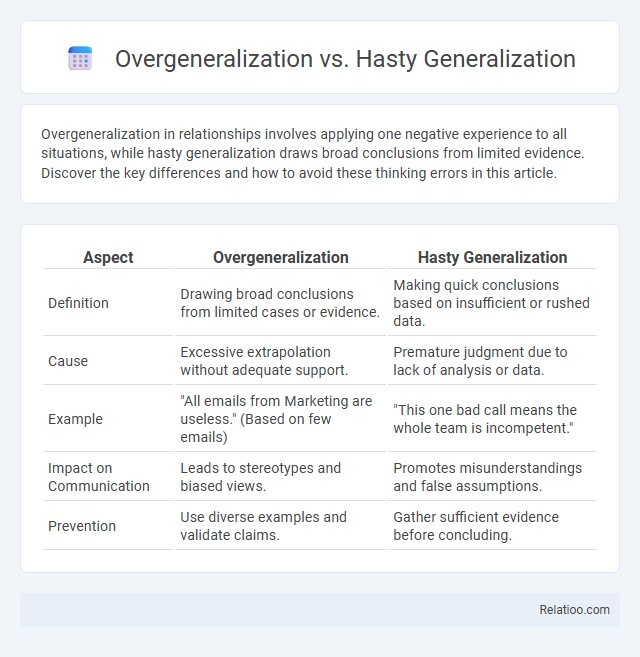Overgeneralization in relationships involves applying one negative experience to all situations, while hasty generalization draws broad conclusions from limited evidence. Discover the key differences and how to avoid these thinking errors in this article.
Table of Comparison
| Aspect | Overgeneralization | Hasty Generalization |
|---|---|---|
| Definition | Drawing broad conclusions from limited cases or evidence. | Making quick conclusions based on insufficient or rushed data. |
| Cause | Excessive extrapolation without adequate support. | Premature judgment due to lack of analysis or data. |
| Example | "All emails from Marketing are useless." (Based on few emails) | "This one bad call means the whole team is incompetent." |
| Impact on Communication | Leads to stereotypes and biased views. | Promotes misunderstandings and false assumptions. |
| Prevention | Use diverse examples and validate claims. | Gather sufficient evidence before concluding. |
Introduction to Overgeneralization and Hasty Generalization
Overgeneralization occurs when a conclusion is drawn from insufficient evidence, applying a single experience broadly beyond its context, often leading to inaccurate beliefs. Hasty generalization, a subtype of overgeneralization, specifically involves making quick conclusions based on a small or unrepresentative sample size. Both cognitive biases impair critical thinking by promoting faulty reasoning that overlooks nuance and counterexamples.
Defining Overgeneralization
Overgeneralization occurs when you apply a specific experience or observation too broadly, assuming it represents all similar cases without sufficient evidence. Unlike hasty generalization, which is a logical fallacy arising from insufficient or biased data, overgeneralization often stems from cognitive distortions in thinking patterns. Understanding this distinction helps you avoid inaccurate conclusions and improves critical reasoning skills.
Defining Hasty Generalization
Hasty generalization is a logical fallacy where a conclusion is drawn from insufficient or biased evidence, leading to a broad claim without adequate support. Unlike overgeneralization, which extends a rule or pattern too far based on valid examples, hasty generalization relies on limited data points, causing potentially inaccurate stereotypes or assumptions. Understanding the distinction helps improve critical thinking and avoids faulty reasoning in argumentation and decision-making.
Key Differences Between Overgeneralization and Hasty Generalization
Overgeneralization involves making broad conclusions based on limited evidence, often extending a specific rule or experience to unrelated situations. Hasty generalization occurs when a conclusion is drawn quickly from insufficient or biased data, leading to inaccurate or premature inferences. The key difference lies in overgeneralization applying a pattern too broadly, while hasty generalization results from inadequate sample size or evidence.
Common Examples of Overgeneralization
Common examples of overgeneralization include children using phrases like "goed" instead of "went" or saying "cats has tails" to refer to all cats, demonstrating a broader application of learned rules beyond exceptions. Overgeneralization often occurs in language acquisition, where learners apply grammatical rules too widely, while hasty generalization refers to drawing conclusions from insufficient or biased evidence. Understanding these distinctions helps in identifying cognitive biases versus language development stages.
Common Examples of Hasty Generalization
Hasty generalization occurs when conclusions are drawn from insufficient or unrepresentative examples, such as assuming all dogs are aggressive after a single encounter with a barking dog. Overgeneralization involves applying one experience too broadly, like believing you fail at everything after a single setback. Your ability to recognize these errors helps improve critical thinking by distinguishing between anecdotal evidence and valid, comprehensive conclusions.
Psychological Roots of Overgeneralization
Overgeneralization stems from cognitive distortions where individuals draw broad negative conclusions based on limited experiences, often rooted in anxiety or depression. This psychological mechanism involves faulty thinking patterns that amplify singular events into pervasive beliefs, unlike hasty generalization which arises from insufficient evidence and logical errors. Understanding these cognitive biases helps in developing targeted therapies to reframe thoughts and reduce maladaptive overgeneralizations.
Impact of Hasty Generalization in Everyday Thinking
Hasty generalization leads to inaccurate conclusions by making broad assumptions based on insufficient evidence, causing flawed decision-making and reinforcing stereotypes in everyday thinking. This cognitive bias often results in unfair judgments and misinterpretations that affect personal relationships, workplace dynamics, and social interactions. Awareness and critical evaluation of evidence can mitigate the negative impact of hasty generalizations, promoting more balanced and rational thought processes.
Strategies to Avoid Overgeneralization and Hasty Generalization
To avoid overgeneralization, emphasize gathering comprehensive evidence and consider exceptions before drawing conclusions, ensuring claims reflect nuanced realities. Prevent hasty generalization by critically evaluating sample size and representativeness, avoiding conclusions based on limited or biased data sets. Employ strategies like seeking diverse perspectives, verifying facts, and applying critical thinking to support accurate and reliable generalizations.
Conclusion: Why Distinguishing These Fallacies Matters
Understanding the distinctions between overgeneralization, hasty generalization, and sweeping generalization is crucial to avoid flawed reasoning and inaccurate conclusions. Each fallacy misapplies evidence differently: overgeneralization extrapolates beyond data limits, hasty generalization relies on insufficient samples, and sweeping generalization ignores exceptions within rules. Recognizing these errors enhances critical thinking, supports sound argumentation, and prevents misleading interpretations in academic, legal, and everyday contexts.

Infographic: Overgeneralization vs Hasty Generalization
 relatioo.com
relatioo.com